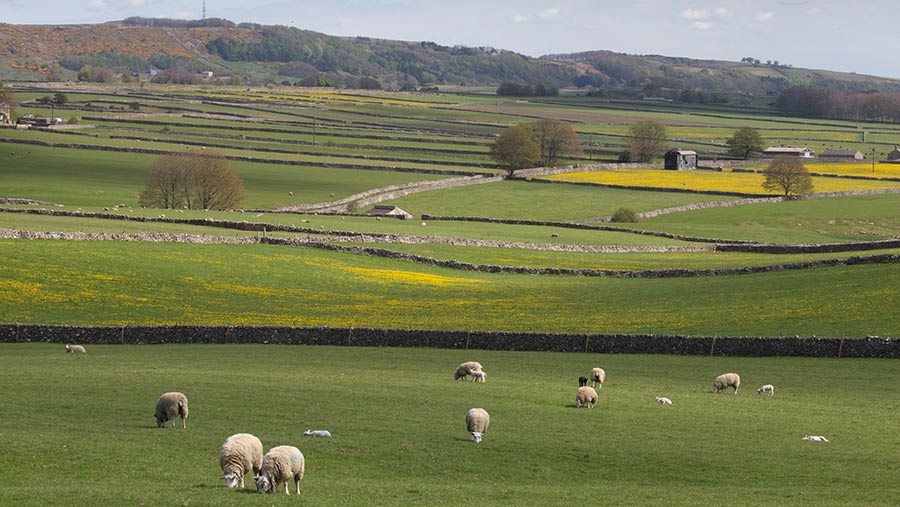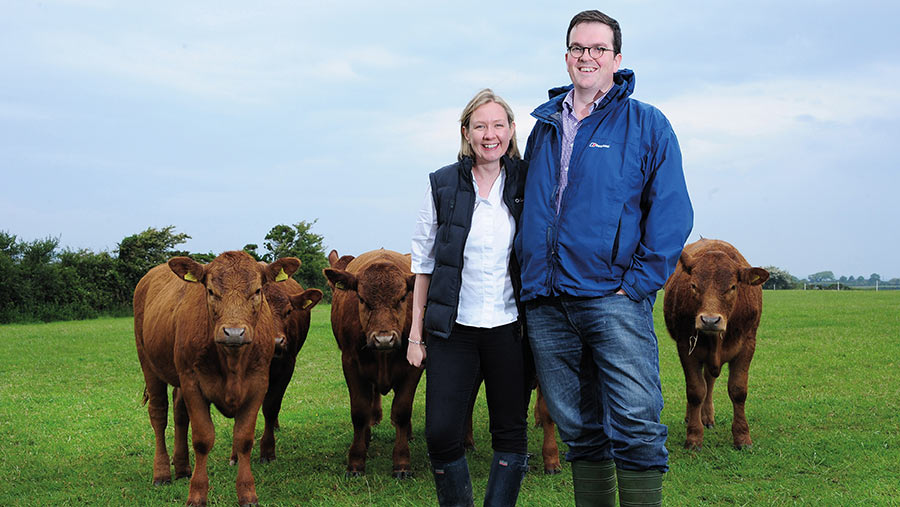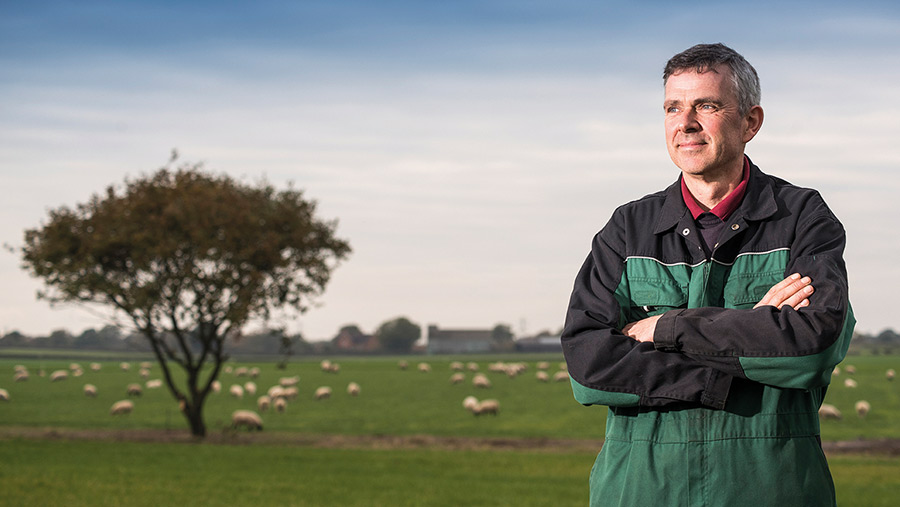Future Farm Resilience Fund: How farms are using free advice
 © Tim Scrivener
© Tim Scrivener Farm management consultancy Laurence Gould Partnership was one of the 19 organisations selected to provide advice in the interim phase of Defra’s Future Farming Resilience Fund (FFRF).
Farmers Weekly asked managing director Keith Leddington-Hill how the scheme has been working.
What are the main findings on-farm?
Farmers have been very receptive to the scheme and have found it very useful for interpreting the new funding options, says Mr Leddington-Hill.
“We found that many applicants were looking for guidance surrounding the impact of BPS [Basic Payment Scheme] reductions and how this could be mitigated. Farmers have found the process useful to help them make sense of the current schemes on offer, with an action plan from the review setting them clear goals to focus on.”
See also: How farmers can benefit from biodiversity net gain
What are applicants generally wanting information and advice on?
Applicants are often looking to find new sources of income, which can offset the loss of BPS and help retain the viability of the farming businesses, according to Mr Leddington-Hill.
“We found a lot of applicants needed guidance on the various new schemes and changes that are evolving as we move into the agricultural transition. There was generally a lot of confusion in this area, with a myriad of information being released in relation to future policy.”
A bespoke review rather than a general appraisal has been preferred by farmers who have signed up for the FFRF advice.
Common areas of improvement
The Countryside Stewardship Scheme (CSS) is one of the most popular options for farmers to consider, especially since most have not previously been in the scheme.
Mr Leddington-Hill said: “The Sustainable Farming Incentive, although not generating a large amount to replace BPS, can make a positive contribution to replacing it.
“There have been many diversification opportunities for farmers to take up, the most common being renting farm buildings. Many have already diversified and are more willing to consider more non-farming income for the future.”
Key advice for farm businesses
Finding new sources of income sooner rather than later is key to help compensate for the loss of BPS, says Mr Leddington-Hill.
Change should not be left to the last minute – look at what enterprises are performing and try to take an outside perspective, he suggests.
Case study: Rosemanowes Farm

© Toby Weller/Cornish Mutual
Peter Green, who farms the 63ha Rosemanowes Farm near Falmouth, Cornwall, took part in the FFRF and received free business advice from the AHDB and AKC Consultancy.
The beef farmer received one-to-one advice from AKC consultant James Berry, who was able to look at the business finances and discuss different options and additional income streams.
Mr Green said: “Just because I have a small business, I don’t see any reason why I shouldn’t be aiming to be in the top 20-25% in terms of performance.”
The farm business review (FBR) online tool was used to assess the farm’s profit and loss and calculate the impact of BPS reductions.
“Spending one-on-one time with James has helped put several different scenarios into play and he was very open and honest about our business. For example, he highlighted that the cattle enterprise is currently not profitable so we should consider either cutting back to just a small handful of cattle or increasing numbers to make it more viable,” Mr Green said.
“Signing up to the FBR service has given me a great opportunity to sense check what we are doing and speak to a professional who is exposed to various business models – some that are working well and others that need to improve.”
Future farming resilience fund round-up
Defra has released more information on the final stage of the FFRF, which was established to offer free consultancy advice to businesses in the transition away from the Basic Payment Scheme (BPS).
The scale-up phase is due to begin in September 2022 and run until March 2025.
Advice worth £32m is being offered for the final phase of the project, considerably more than the previous £10.7m interim phase, which began in August 2021.
The interim phase has now closed or is set to close shortly for most providers. However, several will continue to offer free business advice until 31 August 2022.
An announcement on which providers have been successful in the tendering process for the next stage is due in July.
Have your say
Farmers who took part in the interim stage of the fund have been asked by Defra to provide feedback on the scheme.
Defra is hoping to establish what was useful, what advice was given any changes made to businesses as a result and what the experience was like.
A form to give feedback can be found on the Defra future farming blog.
Prince’s Countryside Fund Farm Resilience Programme
Free business skills training to help family farms plan their future is also available to farms across the UK through the Prince’s Countryside Fund Farm Resilience Programme.
This is open to dairy and livestock businesses and takes a whole-farm and whole-family approach.
The Englefield Estate has 17 tenanted farms on 3,240ha in Berkshire and funded places on the programme to help its tenants adapt to new government farm policies.

Chris Webber © Hype Photography
Chris Webber has been a tenant of the estate since 2005, when he rented a 93ha farm.
Four years ago he took on a neighbouring holding and now produces haylage, hay, straw and wheat across 324ha.
“We’ve got a 15-year farm business tenancy and my vision is to spend five years working hard and 10 years generating money without having to work so hard,” he says.
The former pig farm was in a poor state of repair, and Mr Webber converted buildings into industrial units to rent out. He also has 54 stabled and 40 grass liveries and sells hay and straw to the equine sector. “We grow 40ha of wheat almost as a break crop between the two-to-four-year grass leys.”
Having already worked to generate additional income, Mr Webber was sceptical about what the resilience programme might offer, but it helped him to assess the performance of the business more closely and to start to address succession.
The programme consisted of six sessions with expert speakers. The group of tenants undertook an anonymous benchmarking exercise and learned how to use their farm accounts to better effect, which Mr Webber found useful and has prompted him to analyse his business more closely.
“Accounting isn’t just about tax – we should be looking at each venture individually rather than the farm as a whole,” he says.
Other topics included managing the farmed environment and carrying out a Swot (strengths, weaknesses, opportunities and threats) analysis on the business. The session that had the greatest impact on Mr Webber was succession planning.
“I’ve got four children and was set the task of talking to them about my ambitions for the farm. The generations can get so easily muddled, wanting different things.”
Mr Webber was surprised to learn that his children thought he wanted his two sons to take over the farm rather than his daughters. “I must have given that impression but I’d be delighted if any of them want to take over, although I don’t want to pressure any of them.”
His daughters are actually keener than his sons. “It really got us talking about it, which we’ve never done before,” he says.
